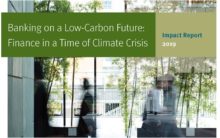A new report from Boston Common Asset Management (BCAM) finds that, despite an explosion of risk assessment tools and green banking industry initiatives in recent years, practical change in the financial sector remains elusive.
Boston Common Asset Management, in partnership with a number of regional partners, engaged 58 of the world’s largest banks, including the likes of HSBC, JP Morgan Chase, BNP Paribas and MUFG. The research identifies some progress in terms of governance, with a majority of banks endorsing the TCFD guidelines (69%), disclosing TCFD governance reforms (71%) and carrying out climate risk assessments (78%).
However, the new research shows these tools are not impacting on decision-making, with 40% of banks failing to develop any new financing or investing exclusions/restrictions as a result of their climate risk assessments.
The result is superficial progress, where over 80% of banks have announced low carbon products and services, but financing for fossil fuels continues to increase each year. The report notes that the green bond industry has grown from just $1 billion a decade ago to over $200 billion in 2019 alone, but this is dwarfed by investment in fossil fuels, totaling $1.9 trillion from 2016–2018.
Lauren Compere of Boston Common Asset Management said that,
“The scale of the climate crisis demands a more radical transformation of the banking sector. Our findings indicate a systematic reluctance by banks to demand higher standards from high carbon sector clients, despite the fact that doing so could vastly reduce bank risk and accelerate action on climate change.”
The report calls for “a cultural shift within banks from the board all the way down to the front-line manager bringing in new business. This must include a willingness to walk away from clients or to no longer issue new financing once existing obligations are paid off.”
Specifically, the report calls on banks to:
- Adopt a clear strategy for decarbonizing balance sheets, including clear timelines for restrictions and phase-outs of financing for fossil fuels and deforestation
- Set explicit targets to increase the proportion of sustainable finance commitments relative to their overall financing activities, noting that 45% of banks have yet to set any such objectives
- Publicize their definitions of ‘low-carbon’ and ‘green’ investment, noting that some green finance commitments appear to be merely re-allocations or rebranding of existing commitments.
- Integrate public policy on climate into overarching climate strategy, engage trade associations on adopting progressive climate policies, and use the company’s public voice to promote progressive climate policy with governments and regulators.
Vincent Kaufmann, CEO of Ethos, endorsed the findings, saying, “Financial institutions are increasingly aware of their influence in the energy transition and of the risks climate change poses to their activities. However, policies and transparency should be reinforced to make sure that general corporate loans are not used for sensitive projects that further fuel climate change.”
Laura Gosset, Senior Analyst at SHARE, noted that, “We were encouraged to see that TD Bank, RBC and CIBC have made sustainable finance commitments in 2019, but what we need is for an accelerated response from Canadian banks that demonstrates an increased ambition that aligns with the goals of the Paris Agreement. This includes policies that clarify exclusions for high carbon sectors and activities causing deforestation.”
Stuart Palmer, Head of Ethics Research at Australian Ethical, said, “Science based restrictions on thermal coal lending need to extend to oil and gas, as Australia faces the prospect of new unconventional gas projects which are inconsistent with 1.5 degrees. The responsible voice of banks and the industry associations they support is also crucial to promote constructive public discussion of climate issues and action.”
Banks Engaged: Agricultural Bank of China Ltd. (China), ANZ (Australia), Axis Bank Ltd. (India), BBVA (Spain), Banco Santander SA (Spain), Bank of China (China), Bank of Communications Co. (China), Bank of America Merrill Lynch (US) BMO (Canada), Barclays Plc. (United Kingdom), BNP Paribas SA (France), CIBC (Canada), CCBC (China), CCB (China), CMB (China), Citigroup Inc. (United States), CBA (Australia), Crédit Agricole CIB (France), Credit Suisse Group AG (Switzerland), Deutsche Bank AG (Germany), DNB ASA (Norway), Fifth Third Bancorp (Australia), HSBC Holdings Plc. (United Kingdom), ICBC (China), China Industrial Bank Co. (China), ING Groep NV (Netherlands), Intesa Sanpaolo SpA (Italy), Itaú Unibanco Holding SA (Brazil), JPMorgan Chase & Co. (United States), Lloyds Banking Group Plc. (United Kingdom), Mitsubishi UFJ Financial Group, Inc. (Japan), Mizuho Financial Group, Inc. (Japan), Morgan Stanley (United States), National Australia Bank (Australia), National Bank of Canada (Canada), Natixis SA (France), Nomura Holdings, Inc.(Japan), Nordea Bank AB (Sweden), Northern Trust Corporation (United States), ORIX Corporation (Japan), BRI (Indonesia), RBC (Canada), RBS (United Kingdom), SEB (Sweden), Société Générale SA (France), Standard Chartered Plc. (United Kingdom), SBI (India), Sumitomo Mitsui Financial Group, Inc. (Japan), SunTrust Banks, Inc. (United States), Scotiabank (Canada), The Goldman Sachs Group, Inc. (United States), The PNC Financial Services Group, Inc. (United States), TD (Canada), UBS AG (Switzerland), UniCredit SpA (Italy), US Bank (US); Wells Fargo & Co. (United States), Westpac Banking Corporation (Australia). Please note that 17 banks did not respond and were analysed based on publicly available information.




